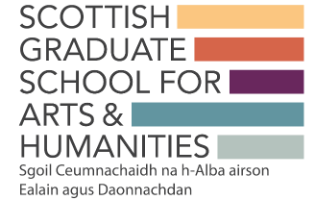University of Glasgow
Location
The researcher will work remotely.
Project
Early Career Researchers (ECRs)– communication and engagement
The researcher will develop materials to improve communication and engagement with ECRs around ‘Researcher Development for staff’ and ‘the Researcher Development Concordat’.
This includes rethinking how current information is shared/presented and creating new materials (i.e webpages, videos, newsletter, images) for current and new projects.
They will look at the networks which ECRs could benefit from and consider new networks or themes which could be beneficial.
Outputs
Create new materials and/or webpages on (not limited to):
- ECR Induction
- Projects (i.e., Funder series, LinkedIn Learning, Postdoc Career talks, 10 days CPD)
- ECR (Postdoc and Fellows) Newsletter
- Researcher Development Concordat media
Explore and innovate with visual ideas to develop a narrative around the Researcher Development Concordat.
Explore the networks which ECRs can engage in and consider new networks/themes that could benefit this staff group.
Timescale
Hours to be worked flexibly from home - Preference would be for consecutive working i.e. a single block but could be part time i.e. one or two days a week.
Benefits to the Host
The aim of this project is to improve the current communication and engagement with ECRs around the support available to them under Researcher Development. To create new materials/communication for new projects/initiatives under the Researcher Development Concordat. To get an understanding of the networks available to ECRs and to explore new opportunities/ needs.
The benefit to the organisation – the outputs of this project will contribute to the work under the university’s Concordat Action Plan. The main benefit will be the creation of resources for ECRs -increasing the support currently provided to this staff group who are an essential part of the university research workforce.
This project fits with organisation overall objectives – as a signatory of the Researcher Development Concordat the university is committed to provide a world class environment to support our 1300+ researchers in their career development. This project will improve and increase the communication with ECRs and provide new resources for them. Increasing awareness of the support and projects which are available to ECRs.
Benefits to the Researcher
- Digital curatorship experience
- Public engagement experience
- Development of specific historical and collections knowledge
- Working as part of the Library and University Collections team
- Development of relationships with heritage bodies in Scotland, wider UK, and Greece
Key Relationships
Benefit:
Work in a team of experts who are working to support researchers. Exposure to the range of support and initiatives which are developed for ECRs. Exposure to a range of colleagues across the university.
Have ownership of a project from development to implementation – creating resources that will contribute to the Researcher Development Teams provisions.
Skills:
The researcher will have the opportunity to develop their skills in analysis and synthesis of information; research and evaluation of specific themes; creating work for digital platforms; learning to use a content management system; creating communication/engagement materials, working with others; working to deadlines; and adapting to new ideas and audiences.
Insight - into Researcher Development – specifically the challenges faced by ECRs and the current sector wide drive/focus to improve the culture and support for ECRs.
Insight - into the Researcher Development Concordat, a university’s action plan/commitment to the Concordat and implementation of the actions.
Insight - into the challenges and opportunities of working within a large organisation.
Key Relationships
Key relationships would be –
- Professional service staff - Researcher Development Team and wider Research and Innovation Services Team
- Research Staff - Postdocs and Fellows
The researcher will mainly be working with Rachel Herries, Researcher Development Specialist (Concordat Implementation).
Subject Areas
|
Archaeology and Classics |
Creative Arts and Design |
||
|
X |
Select all |
X |
Select all |
|
|
Prehistoric Archaeology |
|
Architecture |
|
|
Archaeology of Literate Societies |
|
Creative Writing |
|
|
Archaeology of Human Origins |
|
Dance |
|
|
Archaeological Theory |
|
Design |
|
|
Maritime Archaeology |
|
Drama & Theatre Studies |
|
|
Landscape and Environmental Archaeology |
|
Music |
|
|
Industrial Archaeology |
|
Visual Arts |
|
|
Classical Literature |
|
Curating |
|
|
Classical Reception |
|
|
|
|
Philosophy, Thought and Religion |
|
|
|
|
Epigraphy and Papyrology |
|
|
|
|
Languages and Linguistics |
|
|
|
Cultural and Museum Studies |
History |
||
|
X |
Select all |
X |
Select all |
|
|
Museum and Gallery Studies |
|
Cultural History |
|
|
Museum Policy & Management |
|
Political History |
|
|
Cultural Geography |
|
Imperial/Colonial History |
|
|
Heritage Management |
|
History of Science/Medicine/Technology |
|
|
Conservation of Art and Textiles |
|
War Studies |
|
|
Art History |
|
Religious History |
|
|
Policy, Arts Management and Creative Industries |
|
Economic and Social History |
|
|
Gender and Sexuality |
|
American Studies |
|
|
Cultural Studies and Pop Culture |
|
Post-Colonial Studies |
|
|
Information and Knowledge Management |
|
Scottish Studies |
|
|
Archives |
|
|
|
|
Records Management |
|
|
|
|
Information Science and Retrieval |
|
|
|
|
Library Studies |
|
|
|
|
Information and Knowledge Management |
|
|
|
|
Computational Studies |
|
|
|
Law & Legal Studies |
Linguistics |
||
|
X |
Select All |
X |
Select All |
|
|
Jurisprudence/Philosophy of Law |
|
Textual Editing and Bibliography |
|
|
Human Rights |
|
Syntax |
|
|
Criminal Law and Criminology |
|
Semantics and Pragmatics |
|
|
International Law |
|
Phonetics |
|
|
EU Law |
|
Language Variation and Change |
|
|
Public Law |
|
Lexicon |
|
|
Comparative Law |
|
Linguistic Theory |
|
|
Common Law, including Commercial Law |
|
Morphology and Phonology |
|
|
Law Regulated by Statute |
|
Applied Linguistics |
|
|
Law Relating to Property |
|
Linguistics (General) |
|
|
Legal History |
|
History of English Languages |
|
Media, Comms, Film & TV |
Modern Languages |
||
|
X |
Select all |
X |
Select all |
|
|
Media and Communication Studies |
|
Interpreting and Translation |
|
|
Journalism |
|
Scandinavian Studies |
|
|
Publishing |
|
Asiatic and Oriental Studies |
|
|
Television History, Theory and Criticism |
|
Middle Eastern and African |
|
|
New Media/Web-Based Studies |
|
Italian Studies |
|
|
Film History, Theory and Criticism |
|
Hispanic, Portuguese and Latin Studies |
|
|
|
|
English Language |
|
|
|
|
Comparative Literature |
|
|
|
|
French Studies |
|
|
|
|
Celtic Studies |
|
|
|
|
Australasian Studies |
|
|
|
|
German, including Dutch and Yiddish |
|
|
|
|
Russian, Slavonic and East European Languages and Literature |
|
Philosophy |
Literatures |
||
|
X |
Select all |
X |
Select all |
|
|
Political Philosophy |
|
English, Scottish, Irish and Welsh Literature |
|
|
Philosophy of Mind |
|
Literature from the Anglophone world |
|
|
Aesthetics |
|
Colonial and Post-Colonial Studies |
|
|
Metaphysics |
|
Lifewriting |
|
|
History of Ideas |
|
Children’s Literature |
|
|
Language and Philosophical Logic |
|
Science and Fantasy Writing |
|
|
Epistemology |
|
Poetry |
|
|
Ethics |
|
Literary and Cultural Theory |
|
|
History of Philosophy |
|
Ethnography and Anthropology |
|
|
Philosophy of Science and Mathematics and Mathematical Logic |
|
Gender and Sexuality |
|
|
Philosophy of Religion |
|
|
|
|
|
|
|
|
|
|
|
|
|
|
|
|
|
|
|
|
|
|
|
|
|
|
|
|
Theology, Divinity & Religion |
|||
|
X |
Select All |
|
|
|
|
Old Testament |
|
Sikhism |
|
|
Modern Theology |
|
Alternative Spiritualties/New Religious Movements |
|
|
Judaism |
|
Atheism/Secularism |
|
|
Islam |
|
Inter-faith Relations |
|
|
Liturgy |
|
Contemporary Religion |
|
|
Systematic Theology |
|
|
|
|
Church History and History of Theology |
|
|
|
|
New Testament |
|
|
|
|
East Asian Religions |
|
|
|
|
Buddhism |
|
|
|
|
Hinduism |
|
|
|
|
Jainism |
|
|
Person Specification
|
E |
D |
Essential/Desirable |
E |
D |
Essential/Desirable |
|
A1 – Knowledge Base |
C1 – Professional Conduct |
||||
|
|
|
Subject Knowledge |
|
|
Health and Safety |
|
|
|
Research methods – theoretical knowledge |
|
|
Ethics, principles and sustainability |
|
|
|
Research methods – Practical application |
|
|
Legal requirements |
|
x |
|
Information Seeking |
|
|
IPR and copyright |
|
|
|
Information literacy and management |
|
|
Respect and confidentiality |
|
|
|
Languages |
|
|
Attribution and co-authorship |
|
|
|
Academic literacy and numeracy |
|
|
Appropriate practice |
|
A2 – Cognitive abilities |
C2 – Research management |
||||
|
x |
|
Analysing |
|
|
Research Strategy |
|
x |
|
Synthesising |
x |
|
Project planning and delivery |
|
x |
|
Critical thinking |
|
|
Risk management |
|
x |
|
Evaluating |
|
|
|
|
|
|
Problem Solving |
|
|
|
|
A3 – Creativity |
C3 – Finance, funding & resources |
||||
|
|
|
Inquiring minds |
|
|
Income and funding generation |
|
|
|
Intellectual insight |
|
|
Financial management |
|
x |
|
Innovation |
|
|
Infrastructure and resources |
|
|
|
Argument construction |
|
|
|
|
|
|
Intellectual risk |
|
|
|
|
B1 – Personal qualities |
D1 – Working with others |
||||
|
|
x |
Enthusiasm |
|
|
Collegiality |
|
|
x |
Perseverance |
x |
|
Team working |
|
|
x |
Integrity |
|
|
People management |
|
|
x |
Self-confidence |
|
|
Supervision |
|
|
x |
Self-reflection |
|
|
Mentoring |
|
|
x |
Responsibility |
|
|
Influence and leadership |
|
|
|
|
x |
|
Collaboration |
|
|
|
|
|
|
Equality and diversity |
|
B2 – Self management |
D2 – Communication & dissemination |
||||
|
x |
|
Preparation and prioritisation |
x |
|
Communication methods |
|
x |
|
Commitment to research |
x |
|
Communication media |
|
x |
|
Time management |
|
|
Publication |
|
x |
|
Responsiveness to change |
|
|
|
|
|
|
Work-life balance |
|
|
|
|
B3 – Professional & career development |
D3 – Engagement and impact |
||||
|
|
|
Career management |
|
|
Teaching |
|
|
|
Continuing professional development |
|
|
Public Engagement |
|
x |
|
Responsiveness to opportunities |
|
|
Enterprise |
|
x |
|
Networking |
|
|
Policy |
|
|
|
Reputation and esteem |
|
|
Society and culture |
|
|
|
|
|
|
Global citizenship |
First published: 20 September 2021



